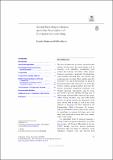Social Interdependence and the Promotion of Cooperative Learning

Editeur(s) scientifique(s)
Sassenberg, KVliek, M. L. W.
Type de référence
Date
2019-07-02Langue de la référence
AnglaisEntité(s) de recherche
Résumé
Social interdependence theory has provided a conceptual framework to understand cooperation and competition through a common mechanism: Social interdependence, i.e., the mechanism whereby the outcomes of individuals in a group are affected by the actions of the other group members. Positive social interdependence is the set of rules, norms, or practices that requires all group members to contribute to a common goal in order to fulfill individual goals. Negative social interdependence requires that some members fulfill their goals to the detriment of others’ goals. We review the research showing how social interdependence affects group members’ perceptions and behaviors, which in turn influence their learning outcomes. We focus on cooperation and the work that showed how cooperation requires positive goal interdependence, but also group members’ responsibility and accountability, interactions directed toward the promotion of the partners, the use of social skills, and critical reflection upon group processes. Then we turn to the literature on cooperative methods in education, and we provide evidence that they favor learning outcomes, psychological and social adjustment, and positive relationships, as compared to competitive and individualistic methods. However, cooperation is vulnerable to threatening social comparison, and we provide evidence that interactions among group members that focus on relative status instead of the task may reduce the beneficial effects of cooperation. Finally, we report an intervention study that illustrates how the implementation of cooperative methods requires training and promotion. Social Interdependence and the Promotion of Cooperative Learning.Titre de l’ouvrage principal
Social psychology in action. Evidence‐based interventions from theory to practiceMaison d’édition
SpingerVille d’édition
ChamPays d'édition
SwitzerlandEvaluation par les pairs (peer reviewing)
ouiPagination
111-128URL permanente ORFEE
http://hdl.handle.net/20.500.12162/5553Autre(s) URL(s) permanente(s)
http://doi.org/10.1007/978-3-030-13788-5_8Document(s) associé(s) à la référence
Texte intégral :
Fichier
Accès
Commentaire
Version
Taille
- Tout ORFEE
- Détail référence



